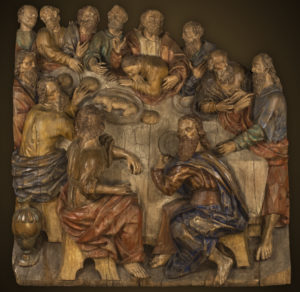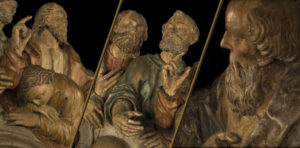The Last Supper
Polychrome and giltwood walnut
Hans Waldburger (attr. to)
Austrian, 1570-1630
One of Scripture’s more commonly depicted stories in art is the Last Supper. This event is represented repeatedly in M&G’s own collection in at least three paintings (on both canvas and panel), a Greek icon, book engravings, Sitzendorf porcelain, and wood sculpture.
Created around 1625, M&G’s sculptural Last Supper is attributed to Hans Waldburger, an Austrian artist in both wood and stone. Little is recorded about him, but he learned his craft from his father, Hans Leonhard Waldburger, while growing up in Innsbruck, Austria. Hans was later guided by Alexander Colin and Hubert Gerhard, a northern follower of the influential Michelangelo-emulator, Giovanni Bologna (or Giambologna).
During Waldburger’s life and work, there was a cultural shift through the influence of both the Protestant Reformation and the Roman Catholic Counter Reformation. Artistically, that transition was expressed through the Mannerist style briefly bridging the movement of the simple, idealized forms of the Renaissance to the busy, dynamic embellishment of the Baroque. This developing ornamentation was articulated in a highly decorative, theatrical style often combining painted imagery with sculptural elements giving the illusion of the story emerging from the flat surface—almost coming to life.
Early in Hans’ career he was commissioned by Archbishop Wolf Dietrich von Raitenau to Salzburg, where he essentially spent the rest of his life. Much of his known work is represented in Austria including such fine examples as the High Altar at both the Basilica Mondsee and Salzburg Cathedral.
M&G acquired The Last Supper in 1963. It is roughly 400 years old and still retains much of its painted color (polychrome) and gold leaf (gilding) in places. Hans’ mannerist style is noticeable in the extended physical features of the apostles as they are seated around the table. The possible supper conversation may be the point in the story when Christ reveals that one of the twelve disciples would betray Him. Their response was, “Is it I?” as recorded in the gospels (Matthew 26:22; Mark 14:19). Though it is known in the culture of Palestine that the partakers would have reclined during the meal, here the group is seated around a table. The sculpture measures approximately 4 feet wide by 4 feet high, and it is almost 1 ½ feet thick! Remarkably, the figures’ distinctive details including curling beards, facial features, and gesturing hands are still intact.
Dealer Edward R. Lubin summarizes the beauty and impact of Waldburger’s Last Supper, “A monumental, virtually in-the-round sculptural group of such quality and scale in this period of German art is truly exceptional.”
John Good, Security Manager
Published in 2019

